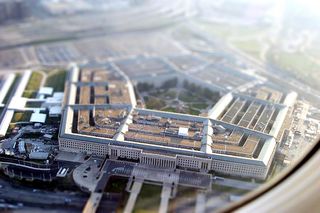 In conjunction with the release of his memoir, Known and Unknown, former Secretary of Defense Donald Rumsfeld is releasing numerous declassified documents from all of his governmental positions over the years. Some of those documents, of course, are think tank-related.
In conjunction with the release of his memoir, Known and Unknown, former Secretary of Defense Donald Rumsfeld is releasing numerous declassified documents from all of his governmental positions over the years. Some of those documents, of course, are think tank-related.
One such memo to Rumsfeld came from Andrew Marshall, the director of the Office of Net Assessment at the Pentagon--a position he was appointed to in 1973 by Richard Nixon and hasn't left the seat since.
Rumsfeld, a man who has been characterized by overthinking his decisions sometimes to the point of impotence, was the perfect person for Marshall to pitch recreating RAND at the Pentagon.
Why? The reason was simple enough, for Marshall. What 9/11 and deciding how to respond showed is how the nature of warfare is changing and will continue to do so, centered around "the notion that the information and communication technologies should lead to new operational methods and ultimately to major changes in warfare."
The problem was that the metrics and the institutions that measured them were too ad hoc and the ability to model information was too weak.
Marshall's answer was to develop a RAND-like organization within the Pentagon to deal with this problem. Better yet: institute two of them and have them compete against each other.
On March 29, 2002, Marshall wrote:
Create a RAND of the 1950's organization and provide it with a broad but clear mission statement. Such a a statement might be something like the development of the science of the information aspects of warfare. The idea would be to bring together a very bright set of people and set them to work over an extended period thinking through the role of information in warfare and developing appropriate analytical tools, metrics and significantly improving our ability to model the contributions of information to the outcomes of combat. This is likely to be a decade long effort and not too expensive, although the bureaucratic obstacles to starting such a new Federal study organization would have to be negotiated with the Congress. I don't think this requires a lot of people; the numbers initially could be quite small, on the scale of 20-25 people in the organization. In any case, the key thing is picking the management and, as in the analogy with RAND, that means finding a Frank Colbohm and people like Charlie Hitch and John Williams to establish its character and provide the intellectual leadership. Because there are no real experts in this area you would need to think about growing future Albert Wohlstetter and Herman Kahns. So young bright people with appropriate academic backgrounds that are willing to focus on concrete problems are what you need. Ideally, if I could, I would start two of these organizations and have them compete way to see which one could provide the best analytic framework for this area, the best case studies of the role of information in warfare, etc.










Comments